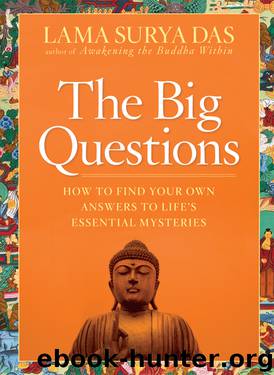The Big Questions by Lama Surya Das

Author:Lama Surya Das
Language: eng
Format: epub
Publisher: Rodale
Published: 2007-05-08T04:00:00+00:00
8
The more we have made our lives meaningful, the less we will regret at the time of death. The way we feel when we come to die is thus very dependent on the way we have lived.
—THE DALAI LAMA
Even death is nothing to fear
For those who have lived wisely.
—THE BUDDHA
What Happens After Death?
Death is the most important question of our time, according to eminent psychologist Robert Lifton. Everyone must wonder about their own demise at sometime during their lifetime. The scientifically minded Dalai Lama says that he is very interested in seeing what happens when he goes through the process of dying and looks forward to it like an experiment. No one wants to die, yet everyone must. Is there an after-life? Most of us want to believe that there is some continuity to our existence and that we don’t face total oblivion after our bodies cease to function. Thus the old adage: To the unbeliever, death is the end; to the believer, the beginning.
Perhaps this seemingly built-in will-to-believe is, in itself, some slight evidence that existence does go on. The key problem in addressing the question of death is that our rational minds—limited to working within our finite, worldly mode of being—can’t penetrate the mysteries of exactly how, where, and in what precise form life continues. Moreover, few and far between are those who return from beyond the pale to inform and update us. How then shall we prepare ourselves better to face death and eternity? Does anyone know for a fact what, if anything, goes on beyond this life?
In Freud’s time, sex and death were unmentionable topics in polite society. Historian Arnold Toynbee joked that death is un-American, referring to our optimistic, youth-oriented nature. A Buddhist joke says that it is easier to die than to stay dead. (This refers to the cycle of rebirth.) Oscar Wilde quipped that “One can survive anything these days except death.” Religions throughout human history have evolved supra-rational cosmologies, teachings, rituals, practices, and articles of faith concerning what happens to us after death, intending to help us overcome the considerable limitations of our logical thinking in order to better confront, and eventually resolve for ourselves, questions about death and its consequences. Otherwise, we can’t help but wonder about, worry about, and, ultimately, fear losing the mortal life we have. Therefore, it’s important for each of us to explore and develop our own ideas on the subject and then to investigate further what other, possibly more compelling, ideas are possible. Simply to avoid the subject or be close-minded about it leaves us wide open to unnecessary, often unconscious, fears and suffering. We may also wind up surprisingly and woefully ill prepared for the critical moment of death when it inevitably arrives, not to mention its aftermath.
Why do we die? The definitive answer is because we are born. Without birth, no death, whether a beggar or a king, a saint, a pet, a fly. Yet we hardly think about it in that way, for
Download
This site does not store any files on its server. We only index and link to content provided by other sites. Please contact the content providers to delete copyright contents if any and email us, we'll remove relevant links or contents immediately.
Becoming Supernatural by Dr. Joe Dispenza(8217)
Crystal Healing for Women by Mariah K. Lyons(7931)
The Witchcraft of Salem Village by Shirley Jackson(7276)
Inner Engineering: A Yogi's Guide to Joy by Sadhguru(6796)
The Four Agreements by Don Miguel Ruiz(6765)
The Power of Now: A Guide to Spiritual Enlightenment by Eckhart Tolle(5784)
Secrets of Antigravity Propulsion: Tesla, UFOs, and Classified Aerospace Technology by Ph.D. Paul A. Laviolette(5371)
The Wisdom of Sundays by Oprah Winfrey(5162)
Room 212 by Kate Stewart(5124)
Pale Blue Dot by Carl Sagan(5009)
Fear by Osho(4740)
The David Icke Guide to the Global Conspiracy (and how to end it) by David Icke(4720)
Animal Frequency by Melissa Alvarez(4474)
Rising Strong by Brene Brown(4464)
How to Change Your Mind by Michael Pollan(4357)
Sigil Witchery by Laura Tempest Zakroff(4247)
Man and His Symbols by Carl Gustav Jung(4137)
The Art of Happiness by The Dalai Lama(4130)
Real Magic by Dean Radin PhD(4129)
